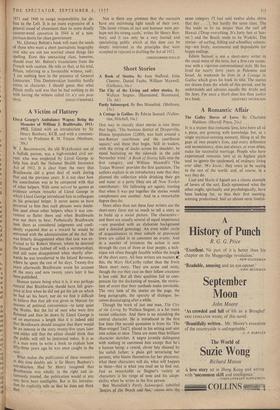A Victim of Flattery
Lloyd George's Ambulance Wagon: Being the Memoirs of William J. Braithwaite, 1911- 1912. Edited with an introduction by Sir Henry Bunbury, KCB, and with a commen- tary by Professor R. M. Taws. (Methuen, 30s.) W. J. BRAITHWAITE, the old Wykehamist son of a Suffolk parson, was a high-minded civil ser- vant who was employed by Lloyd George to help him draft the National Health Insurance Act of 1912. It is clear from the story that Braithwaite did a great deal of work during that and the previous years. It is not clear how his contribution was to be compared with that of other helpers. With some naiveté he quotes as evidence certain remarks of Lloyd George in which Lloyd George introduced him to colleagues as his principal helper. It never seems to have occurred to him that such phrases were doubt- less used about other helpers when it was con- venient to flatter them and when Braithwaite was not there to hear. Pathetically Braithwaite took them as considered judgments and confi- dently expected that as a reward he would be entrusted with the administration of the Act. He Was bitterly disappointed when that task was en- trusted to Sir Robert Morant, whom he detested (he himself was fobbed off with a secretaryship), and still more disappointed when shortly after- wards he was transferred to the Inland Revenue, where he spent the rest of his days. Twenty-five Years afterwards Braithwaite wrote his account of the story and now twenty years later it has been published.
Human nature being what it is, it was perhaps natural that Braithwaite should have felt griev- ance at first when he did not get the job on which he had set his heart, nor do we find it difficult to believe that thaj job was given to Morant for reasons of political convenience—to keep quiet the Webbs. But the list of men who were first flattered and then let down by Lloyd George is of so enormous a length that it is indeed odd that Braithwaite should imagine that there would be an interest in the story twenty-five years later and odder still that the editor should think that the public will still be interested today. It is as if a man were to write a book to explain how fifty-three years ago he was once caught in the rain.
What makes the pubilcation of these memoirs at this time doubly ode. is Sir Henry Bunbury's introduction. Had Sir Henry imagined that Braithwaite was wholly in the right and in- famously treated, the publication would at any rate have been intelligible. But in his introduc- tion he explicitly tells us that he does not think that Nor is there any pretence that the memoirs have any enlivening light touch of their own. 'The lesser virtues of ,tact and humour were per- haps not his strong cards,' writes Sir Henry Burt- bury, and it can only be a very limited and specialising public which at this date can be deeply' interested in the principles that were accepted or rejected in drafting the Act of 1912.
CHRISTOPHER HOLLIS
































 Previous page
Previous page